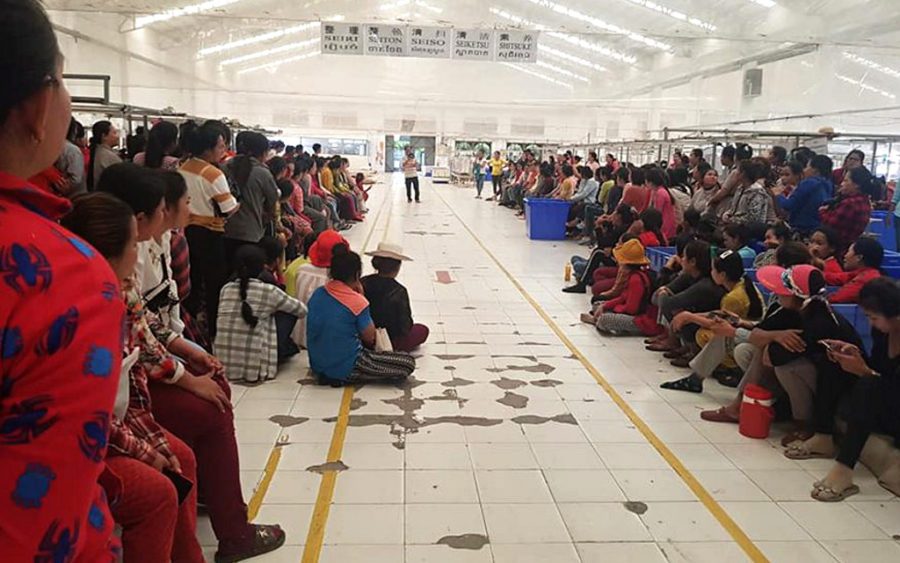Nearly 2,000 garment workers in Kandal province protested this week as owners reduced their work or shut down the businesses altogether.
More than 900 workers from sister factories Dignity Knitter and Eco Base Factory in Prek Tra Pring village in Sa’ang district’s Sitbou commune have protested for the past six days to demand their unpaid salaries and seniority payment.
Phin Sophea, head of the local chapter of the Coalition of Cambodian Apparel Workers Democratic Union (CCADU), told VOD that workers are struggling to pay their bills and expenses after the company failed to pay them since mid-December.
“When the company does not pay workers regularly, workers face expenses for their rent and utilities, daily expenses and school fees for children,” Sophea said. “Almost 90 percent of our workers, including me, have debt with the banks, and this is the challenge for workers.”
Following a meeting between the CCADU, company and Labor Ministry, the factories’ owner promised to pay $50 to the workers for the second period of December by Wednesday, Sophea said. Workers decided to return to work on Thursday as long as they received the payment, but the owner has not yet said when January’s compensation would arrive.
Asked why the factories had failed to pay the workers on time, Lao Hort, administrative chief for the Dignity Knitter and Eco Base factories, refused to comment, saying it was an internal affair.
Leng Srey, deputy head of the CCADU’s chapter at Eco Base Factory, said this was not the first time the factory had been unable to pay workers on time, and she was concerned the owners from Hong Kong would close the factory without warning.
“We are really suffering but don’t know what to do,” Srey said. “The owner said they will not close, but we don’t know what their intention is. So, the government should help push the owner to pay regularly because workers are struggling.”
Chheang Thida, another union leader at the factories, said between last October till November, the owner paid only 50 percent of workers’ salaries, while the company didn’t pay at all from mid-December to January.
Thida said workers had asked for assistance from the Ministry of Labor through the end of last year, but they received no response.
“They seem to let the employers do this,” she said. “They only talked about the mistake of the workers, and it is an injustice to workers.”
The workers from the two Sa’ang district factories joined another 600 workers from Kandal’s Zhong Yin (Cambodia) B Textile, who have been protesting for a month and a half. Workers said the owner of the Kandal Stung district, Siem Reap commune factory laid them off in December without informing them or providing compensation.
Tom Soeun, administrative chief at Zhong Yin, said his company had to pay its workers late and terminated the workers’ contracts early because of the factory’s financial issues, but he claimed the company would find a solution for workers when it could.
“We don’t have orders from customers anymore,” he said. “So the factory doesn’t have the salary for workers. But we have given [money] to workers in installments and they agreed with this method since October, November and December.”
Thol Neang, director of the Kandal provincial labor department, said the three cases had been sent to the Labor Ministry after local authorities could not find a solution.
The labor conflict at Zhong Yin factory was sent to the ministry’s committee for the settlement of strikes and demonstrations, while the Sa’ang district factories’ dispute went to the Arbitration Council.
“We’ve got some good results. [Zhong Yin workers] will get benefits that the factories need to provide to them, but [the workers] haven’t agreed yet. It’s all I can do for this case. For the rest, the committee will continue to resolve it,” Neang added.
The Labor Ministry did not respond to multiple requests for comment.













